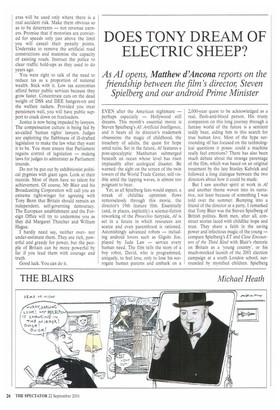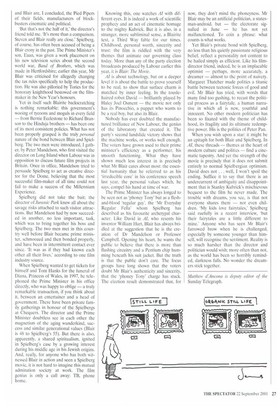DOES TONY DREAM OF ELECTRIC SHEEP?
As Al opens, Matthew d'Ancona reports on the friendship between the film's director; Steven
Spielberg and our android Prime Minister
EVEN after the American nightmare — perhaps especially — Hollywood still dreams. This month's essential movie is Steven Spielberg's Al.' Artificial Intelligence, and it bears all its director's trademark obsessions: the magic of childhood, the treachery of adults, the quest for hope amid ruins. Set in the future, Al features a post-apocalyptic Manhattan submerged beneath an ocean whose level has risen implacably after ecological disaster, Be warned: the sight on the screen of the twin towers of the World Trade Center, still visible amid the lapping waves, is almost too poignant to bear.
Yet, as all Spielberg fans would expect, a streak of childlike optimism flows remorselessly through this movie, the director's 19th feature film, Essentially (and, in places, explicitly) a science-fiction reworking of the Pinocchio fairytale, Al is set in a future in which resources are scarce and even parenthood is rationed. Astonishingly advanced robots — including android lovers such as Gigolo Joe, played by Jude Law — service every human need. The film tells the story of a boy robot, David, who is programmed, uniquely, to feel love, only to lose his surrogate human parents and embark on a 2,000-year quest to be acknowledged as a real, flesh-and-blood person. His trusty companion on this long journey through a fantasy world of the future is a sentient teddy bear, aiding him in this search for true human love, Most of the hype surrounding Al has focused on the technological questions it poses: could a machine really feel emotions? There has also been much debate about the strange parentage of the film, which was based on an original treatment by the late Stanley Kubrick and followed a long dialogue between the two directors about how it could be made.
But I saw another spirit at work in Al and another theme woven into its narrative, not least because of something I was told over the summer. Bumping into a friend of the director at a party, I remarked that Tony Blair was the Steven Spielberg of British politics. Both men, after all, construct stories laced with childlike hope and trust. They share a faith in the saving power and infectious magic of the young — compare Spielberg's ET and Close Encounters of the Third Kind with Blair's rhetoric on Britain as a 'young country', or his much-mocked launch of the 2001 election campaign at a south London school, surrounded by mystified children. Spielberg
and Blair are, I concluded, the Pied Pipers of their fields, manufacturers of blockbusters cinematic and political.
But that's not the half of it,' the director's friend told me. 'It's more than a comparison. Steven and Blair really are close.' Spielberg, of course, has often been accused of being a Blair crony in the past. The Prime Minister's son, Euan, was given a work placement on his new television series about the second world war, Band of Brothers, which was made in Hertfordshire; earlier this year, Mr Blair was criticised for allegedly changing the tax rules specifically to help the production. He was also pilloried by Tories for the honorary knighthood bestowed on the filmmaker in the New Year's honours.
Yet in itself such Blairite backscratching is nothing remarkable: this government's wooing of tycoons and moguls in every field — from Bernie Ecclestone to Richard Branson to the Hinduja brothers — has been one of its most consistent policies. What has not been properly grasped is the truly personal nature of the bond between Blair and Spielberg. The two men were introduced, I gather, by Peter Mandelson, who first visited the director on Long Island when Labour was in opposition to discuss future film projects in Britain. Once in office, Mandelson tried to persuade Spielberg to act as creative director for the Dome, believing that the most successful film-maker of all time could not fail to make a success of the Millennium Experience.
Spielberg did not take the bait; the director of Jurassic Park knew all about the savage risks attached to such visitor attractions. But Mandelson had by now succeeded in another, no less important, task, which was to bring together his boss and Spielberg. The two men met in this country well before Blair became prime minister, schrnoozed and then bonded properly, and have been in intermittent contact ever since. 'It was as if they had known each other all their lives,' according to one film industry source.
When Spielberg wanted to get tickets for himself and Tom Hanks for the funeral of Diana, Princess of Wales, in 1997, he telephoned the Prime Minister in his office directly, who was happy to oblige — a truly remarkable transaction, if you think about it, between an entertainer and a head of government. There have been private family gatherings in honour of the Spielbergs at Chequers. The director and the Prime Minister doubtless see in each other the magnetism of the aging wunderkind, success and similar generational values (Blair is 48 to Spielberg's 55). But there is also, apparently, a shared spiritualism, ignited in Spielberg's case by a growing interest during his middle age in his Jewish origins. And, really, for anyone who has both witnessed Blair in action and seen a Spielberg movie, it is not hard to imagine this mutual admiration society at work. The film genius is only a call away: TB, phone home.
Knowing this, one watches Al with different eyes. It is indeed a work of scientific prophecy and an act of cinematic homage to the mighty Kubrick. But it is also, in a stranger, more subliminal sense, a Blairite text, a Third Way fable for our times. Childhood, personal worth, sincerity and trust: the film is riddled with the very themes that animate our governing class today. More than any of the party election broadcasts produced by Labour earlier this year, it is Blair: The Movie.
Al is about technology, but on a deeper level it is about the battle to prove yourself to be real, to show that surface charm is matched by inner feeling. In the touslehaired robot David — brilliantly played by Haley Joel Osment — the movie not only has its Pinocchio, a puppet who wants to be a real boy, but also its Blair.
Nobody has ever doubted the manufactured brilliance of New Labour, the genius of the laboratory that created it. The party's second landslide victory shows that the machine works, or works well enough. The voters have grown used to their prime minister's efficiency as a performer, his smooth functioning. What they have shown much less interest in is precisely what Mr Blair cares about most: the essential humanity that he referred to as his 'irreducible corein his conference speech last year. the personal values which, he says, compel his hand at time of war.
The Prime Minister has always longed to be seen not as 'phoney Tony' but as a fleshand-blood 'regular guy', the 'Mr Everyday Regular Fella' whom Spielberg has described as his favourite archetypal character. Like David in Al, who resents his inventor William Hurt, Blair has always bridled at the suggestion that he is the creation of Dr Mandelson or Professor Campbell. Opening his heart, he wants the public to believe that there is more than flashing circuitry and a Pentium chip humming beneath his suit jacket. But the truth is that the public don't care. The focus groups have long shown that the voters doubt Mr Blair's authenticity and sincerity, that the 'phoney Tony' charge has stuck. The election result demonstrated that, for now, they don't mind the phoneyness. Mr Blair may be an artificial politician, a statesman-android, but — the electorate signalled in June — he has not yet malfunctioned. To coin a phrase: what counts is what works.
Yet Blair's private bond with Spielberg, no less than his quietly passionate religious belief, reflect a personality not content to be hailed simply as efficient. Like his filmdirector friend, indeed, he is an implacable optimist — perhaps, more accurately, a dreamer — almost to the point of naivety. Margaret Thatcher made politics a titanic battle between tectonic forces of good and evil. Mr Blair has tried, with words that many find too gushing, to recast the political process as a fairytale, a human narrative in which all is new, youthful and innocent. No other modern politician has been so fixated with the theme of childhood, its fragility and its ultimate redemptive power. His is the politics of Peter Pan.
When you wish upon a star: it might be an epitaph for both Blair and Spielberg. In Al, these threads — themes at the heart of modern culture and politics — find a cinematic tapestry. And yet the strength of the movie is precisely that it does not submit entirely to normal Spielbergian optimism. David does not . . well, I won't spoil the ending. Suffice it to say that there is an undercurrent of ambiguity and disappointment that is Stanley Kubrick's mischievous bequest to the film he never made. The trouble with dreams, you see, is that not everyone shares them — not even children. 'My kids love fairytales,' Spielberg said ruefully in a recent interview, 'but their fairytales are a little different to mine.' Anyone who has seen Mr Blair's furrowed brow when he is challenged, especially by someone younger than himself, will recognise the sentiment. Reality is so much harsher than the director and politician would wish; more often than not, as the world has been so horribly reminded, darkness falls. No wonder the dreamers stick together.
Matthew &Ancona is deputy editor of the Sunday Telegraph.











































































 Previous page
Previous page